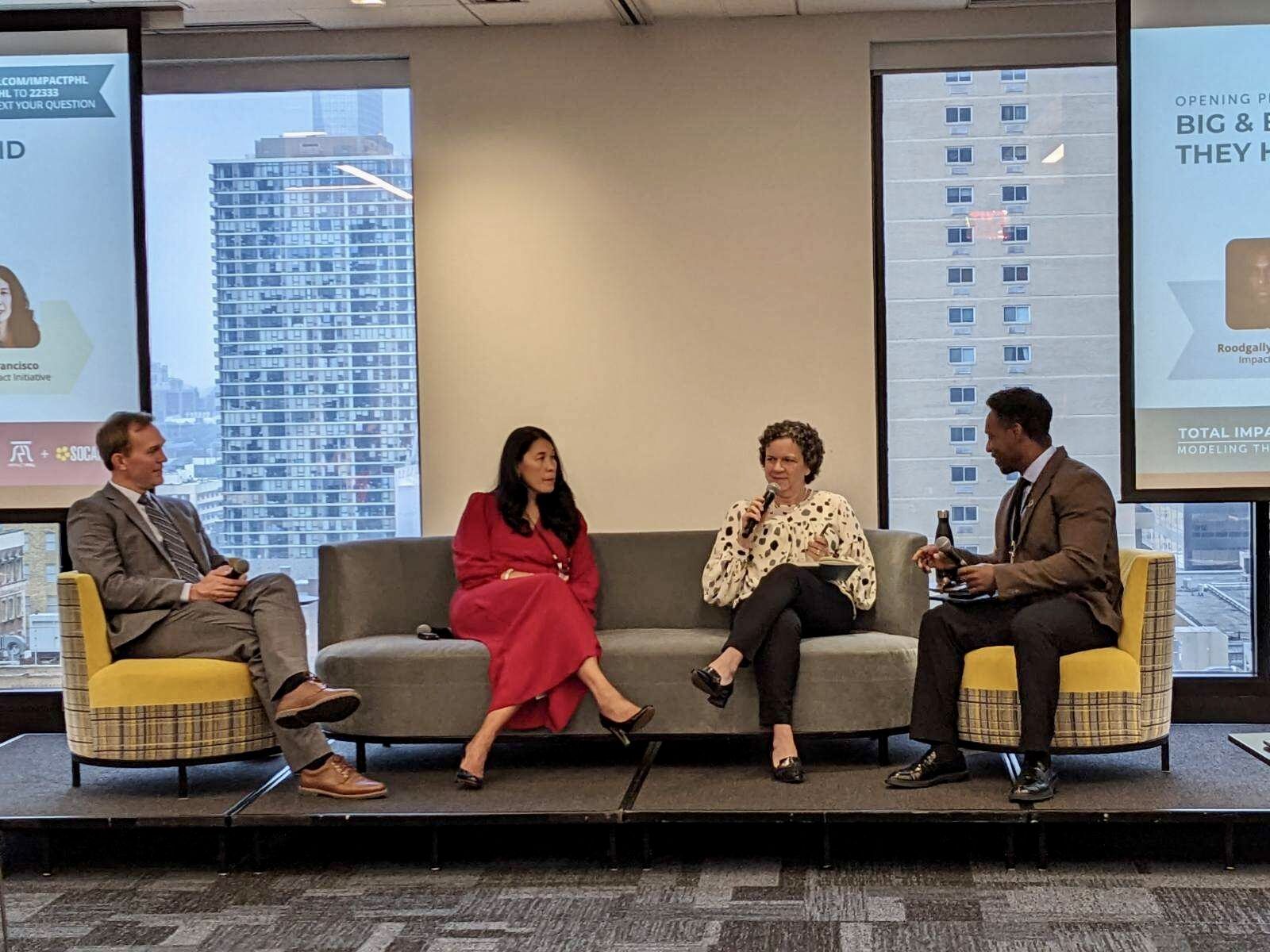Greetings, Agents of Impact!
Featured: ImpactAlpha Original
Call No. 24: Agents of Impact converge on financing solutions to ‘light every clinic’ (video). The people and principles needed to solve the challenges of financing solar power for frontline health clinics in Africa, Asia and elsewhere were represented on ImpactAlpha’s Agents of Impact Call No. 24 earlier this month. Now to put the pieces together (see, “Inside the scramble for solar financing as frontline public health clinics confront COVID”). The Call, co-hosted with nonprofit We Care Solar, was framed as a design challenge to identify models of innovative finance that can be applied to a knotty problem. We Care Solar has distributed more than 5,000 quickly-deployable “solar suitcases” to reduce maternal and newborn mortality in childbirth. But scaling up full-country solutions has been stymied by the complexity of equipping public facilities (vs. private clinics), and primary or frontline clinics (vs. larger secondary or hospital facilities), all overlaid by the silos that still exist between health, energy and finance ministries and even between global aid and philanthropic donors. The dozens of health, energy and finance practitioners who introduced themselves on The Call “can fix this,” said energy strategist Michael Liebreich. “All of the case studies are there. The technology is there.”
Current initiatives appear to be converging on some shared elements. Energy-as-a-service, where long-term energy services packages are tailored for health clinics, including maintenance and battery upkeep, turns high upfront capital costs into affordable longer-term operating costs. Portfolio aggregation of solar installations across dozens or hundreds of facilities builds project portfolios large enough to attract investors. Power purchase agreements, including off-take agreements with national-level ministries of health, provide the revenue streams needed to repay project financing, most likely with… Revenue subsidies. Philanthropic and foreign-aid donor funds can augment the limited ability of health ministries to pay, but funding should be based on demonstrated health outcomes, such as healthy childbirth, vaccination rates or COVID response. Guarantees to further backstop the off-take agreements can crowd in commercial lenders. Financing and fulfillment from commercial banks and local bonds can provide the upfront capital once terms are established. With capital in hand, local solar installers and distributors will be drawn to the health sector.
Read on and watch, “Call No. 24: Agents of Impact converge on design specs to ‘light every clinic’ (video),” by David Bank on ImpactAlpha.
Dealflow: Follow the Money
Electric bus maker Proterra raises $200 million. The Burlingame, Calif.-based company was backed by Cowen Sustainable Advisors, Soros Fund Management, Generation Investment Management, and Broadscale Group. Obvious Ventures was an early investor (see, “Talking trillion-dollar sustainability disruptions with Obvious Ventures’ Andrew Beebe”). Proterra and other electric vehicle makers are on a fundraising tear, as policymakers seek to accelerate the shift to electric transport. Four electric vehicle makers have plans to go public through special purpose acquisition companies, or SPACs. California-based Motiv recently raised $15 million to speed the transition of standard commercial fleets to electric. Get charged up.
Chelsea Clinton’s VC fund backs edtech startup Fiveable. Back in July, Axios reported that Clinton was “kicking around the idea” for a venture fund to invest in two sectors heavily impacted by the global pandemic: health and education. Her firm, Metrodora Ventures, made its first investment in online learning startup Fiveable, which is working to “democratize” access to advanced placement high school courses and offer online test preparation. “Our goal is to create inclusive and social learning experiences where all students are invited to learn with us for free,” the company says. Fiveable says it has served more than 1.5 million students.
- Edtech investors. Metrodora invested in the women-led company’s $2.3 million round alongside female founder-focused BGG Ventures, the round’s lead investor, Spero Ventures, Matchstick Ventures, Cream City Venture Capital, 27V, Golden Angel Investors, businesswoman Deborah Quazzo and SoGal.
- Check it out.
Lightship Capital invests in mobile dentistry startup Kare Mobile. Poor, senior and rural Americans lack adequate access to affordable oral healthcare. Government programs like Medicare and Medicaid often do not cover dental care for adults. Louisville, Ky.-based Kare Mobile, a mobile dentistry provider, serves under-represented communities with an app-based scheduling system, and back-end support for dentists that want to build affordable, physically mobile practices (think dental vans.) Lightship Capital invested an undisclosed amount of capital in the Black-led company. Read on.
Signals: Ahead of the Curve
SOCAP survival guide. “Radical change” is a fitting theme for this year’s virtual SOCAP conference, kicking off today. Look for Main Stage announcements from Sorenson Impact Foundation, the U.S. Impact Investing Alliance, BlueMark and Google’s Black Founders Fund. The agenda includes nearly 200 sessions over four and a half days.
- Tune in today. Jamie Arbib of think tank RethinkX and sustainability guru John Elkington will discuss the “regenerative evolution” at 8:10am PT… Prime Impact Fund’s Amy Duffuor, Ceniarth’s Greg Niechen, Mission Driven Finance’s Laura Grattan, and Howard Fischer of Gratitude Railroad and Basso Capital Management will explore bold and innovative initiatives for the post-COVID world at 2pm PT… Two fireside chats will take up gender lens questions, starting with Vicky Lay of Artesian (2:30pm PT), followed by Jenny Abramson of Rethink Impact (3pm PT).
- 10 ways to keep Zoomed-out audiences Zoomed-in. Conference participants may be in front of a screen, but they can feel the energy in the “room,” says Aunnie Patton-Power, a lecturer at Oxford and University of Cape Town. Among the engagement tips Patton-Power shares in a guest post on ImpactAlpha: help participants feel heard, with tools like polls and chat Q&As, and foster collaboration with shared docs to help people feel that they’re “building something together.” Most important: be authentic and energetic. Catch Patton-Power, along with panelists from Solidaridad and Oxford’s Said Business School, in “Pay for Impact: Democratizing Impact Through Digital Interventions,” at SOCAP on Tuesday, Oct. 20 at 10:30am PT. Collect all 10.
- More of What’s on at SOCAP.
Agents of Impact: Follow the Talent
Ryan Caldbeck steps down and Nick Talwar steps up as CEO of funding platform CircleUp… MassChallenge selects 48 startups from Boston, Austin, Rhode Island and Houston to compete for $2 million in equity-free cash and prizes. Winners to be announced on Thursday, Oct. 22… Forward Community Investments is looking for a chief executive officer in Madison, Wis… UtilityAPI is hiring a vice president of sales… The Forum for Sustainable and Responsible Investing’s “Fundamentals of Responsible Investing” course is now free for advisors thanks to a grant from the Rockefeller Foundation.
Rockefeller Philanthropy Advisors and Toniic are hosting an event on strategic frameworks and actionable tools for asset owners featuring Cornerstone Capital’s Erika Karp, Eric Stephenson of Align Impact, Jennifer McFarlane, Karim Harji of Oxford Impact Measurement Programme, and Nia Impact Capital’s Kristin Hull, Wednesday, Oct. 28… The Start.coop accelerator seeks applications from cooperative start-ups across North America.
Thank you for reading.
–Oct. 19, 2020











